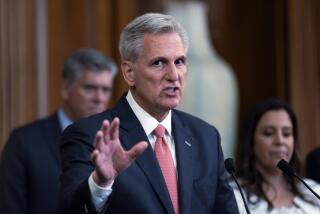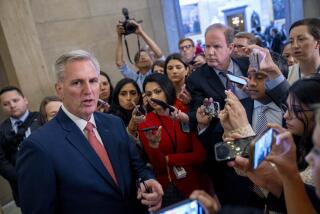Clinton Weighs a Public Speech of Contrition
- Share via
WASHINGTON — Seeking to regain political momentum and move the nation’s attention beyond scandal, President Clinton is likely to make a second public statement on his relationship with Monica S. Lewinsky, followed by a fall campaign on popular issues like education and health care, aides said Friday.
Clinton associates said there is a growing consensus in the White House in favor of a new presidential statement expressing more “contrition” over his sexual relationship with the former White House intern.
Clinton made a four-minute televised speech on the affair Monday, but a growing number of senior figures in the president’s own party have said that was not enough.
“There is a general feeling that more needs to be said,” according to a senior White House aide. “It hasn’t become a concrete proposal yet.”
“It is conventional wisdom that he needs to speak out again,” another source familiar with the discussions said. “The forum has yet to be decided. But I think everyone is convinced. . . . He’s got to strengthen his base and he has to do what he can to strengthen the resolve of Democrats on [Capitol] Hill.”
Advisors have discussed whether Clinton should make his remarks in a television interview, a speech or some other form, but no decision has been made. One consideration: The president doesn’t want to submit to questioning about his relationship with Lewinsky or his testimony before the federal grand jury Monday.
And a few advisors still question the need for another statement. “How many apologies does he have to make?” asked one. “At some point, it begins to reek a little bit of Richard Nixon.”
The discussion of a second apology has complicated Clinton’s strategy to change the subject of the nation’s conversations from the Lewinsky controversy to issues of his own choosing: education, health care and the environment.
Since his first run for the presidency in 1992, Clinton repeatedly has recovered from dizzying political reverses by returning doggedly to his core agenda. This fall’s plan follows the same pattern.
President Aims to Get ‘Message’ Across
Last weekend, even as he prepared for his testimony before independent counsel Kenneth W. Starr, Clinton spent time reviewing a list of proposed “message” events for the fall.
Beginning next week, the president will seek opportunities to talk about his proposals for federal action on the environment, education and health care regulation, aides said.
A centerpiece, deliberately chosen for the “back-to-school” week of Aug. 31, will be rejection by the House of $1.8 billion in Clinton proposals on education, White House Communications Director Ann Lewis said.
“The American people have their priorities in order: Between their children’s education and Ken Starr, they’re more interested in their children,” Lewis said.
The aim is twofold: to reinforce the message that Clinton is working on issues that the public considers more important than Lewinsky and to throw down a gauntlet before congressional Republicans who will return to Washington next month.
As a result, Democratic insiders increasingly expect stormy confrontations between the president and Republicans in Congress this fall, particularly over the budget.
As he struggles to rebuild his political capital, Clinton, who once sought quiet compromises with Congress, now has more incentive to battle the GOP, they said.
Aides and advisors cited three reasons to expect tough partisan battles:
First, some Clinton aides have long argued that the best way he can recover from questions about his personal character is to display what they call “public character” by taking on tough fights.
Second, with impeachment hearings still possible in the House, Clinton needs to unify his support among congressional Democrats--and that’s always been easier for him to do by butting heads with Republicans than by making deals with them.
Finally, Democratic strategists are eager to find ways to sharpen their party’s differences with the GOP and give their partisans reason to vote in the weeks before November’s midterm election.
Democrats Worry About Voter Apathy
Democratic members of Congress have expressed increasing fear that the Lewinsky scandal could discourage some of the party’s supporters from turning out at the polls--and, at the same time, encourage Republicans to vote.
Even a small shift in turnout could have a significant effect. “In the 40 closest [House] races, if 1% of the vote doesn’t turn out, that’s a big deal,” noted Mark Gersh of the National Committee for an Effective Congress, a liberal group that works closely with Democrats.
Democrats have tried to spark interest over several issues, but so far most of them have failed to catch fire. Since January, Republicans have systematically shelved the ambitious agenda Clinton laid out in his State of the Union address. They have voted down his education reforms, rejected sweeping anti-tobacco legislation he supported and ignored the president’s proposals to create new tax breaks for child care expenses and raise the minimum wage. Clinton’s calls for a “patient’s bill of rights” to regulate managed health care appear likely to fail in September as well.
Contrary to Democratic expectations, the Republicans have not suffered noticeably for their stands--partly because the fights have been eclipsed by the media focus on the scandal and partly because the country’s general contentment has made voters less attentive. Congress’ approval rating--meaning the GOP majority--remains high by historical standards. Democrats had hoped for a public backlash after the Republicans sank the tobacco bill, but it never materialized.
September gives Clinton and the Democrats one last chance to sharpen their differences with the GOP and regain some momentum for the election. The two parties are steaming toward a confrontation over the budget--and perhaps taxes and Social Security--with echoes of their 1995 showdown that produced two government shutdowns and revived Clinton’s presidency.
The administration already has threatened to veto seven of the 13 appropriation bills that are required to keep the government running. Clinton is objecting both to the levels of spending that the GOP provides for administration priorities, such as education and summer jobs, and to “riders” that congressional Republicans have attached to the bills on issues such as barring the Census Bureau from using statistical sampling in 2000 or restricting the Environmental Protection Agency’s authority to regulate greenhouse gases.
With the Lewinsky scandal in the background, the White House is talking tough as the collision over the spending bills approaches. “We hope to make the battle lines over the budget as clear as possible in September, and that’s where we will be engaged primarily,” said one senior White House aide.
Republicans already have begun to publicly accuse Clinton of trying to engineer another budget shutdown by vetoing the appropriation bills--both to divert attention from the scandal and to inspire his base for November. While some Republicans think the scandal will make Clinton more fearful of provoking a confrontation, “the vast majority of our members think he’s capable of trying to create a shutdown and trying to blame us in an effort to destroy us,” said one senior House GOP leadership aide.
Faced with that risk, the aide said, most House Republicans believe that their best strategy is to make concessions to Clinton on the spending bills that prevent him from forcing a showdown--much less a shutdown. But many conservatives are likely to resist giving ground to Clinton while he is weakened--particularly because his admission of an improper relationship with Lewinsky has heightened the already intense antipathy toward him among the Republican base.
GOP Also Finds Its House Divided
Republicans face the same divisions over taxes. In the last few weeks, some House GOP leaders have argued for using the government surplus to fund a massive tax cut, which would put them in direct conflict with Clinton’s call for reserving the surplus until Congress agrees on long-term Social Security reforms. The House leaders have been stymied by Senate Republicans who fear that using the surplus for tax cuts would allow Clinton to accuse them of endangering Social Security.
GOP political strategists generally have sided with the Senate, worrying that a preelection fight over Social Security and tax cuts might provide the White House an opportunity to rouse Democratic voters discouraged by Clinton’s troubles. For that reason, key GOP officials now believe Congress likely will settle on a scaled-down tax bill that phases out the marriage penalty for two-income couples but does not cut into the budget surplus.
A senior White House official agreed. “We have won [on] Social Security vs. taxes,” said presidential counselor Rahm Emanuel. “If they go for a sucker punch, it will be like the government shutdown all over again. That would be a foolish mistake if they once again underestimate Bill Clinton.”
The latest Times Poll assessing Americans’ views of President Clinton is on The Times Web site. Go to: http://ukobiw.net./clintonpoll
More to Read
Get the L.A. Times Politics newsletter
Deeply reported insights into legislation, politics and policy from Sacramento, Washington and beyond. In your inbox twice per week.
You may occasionally receive promotional content from the Los Angeles Times.











